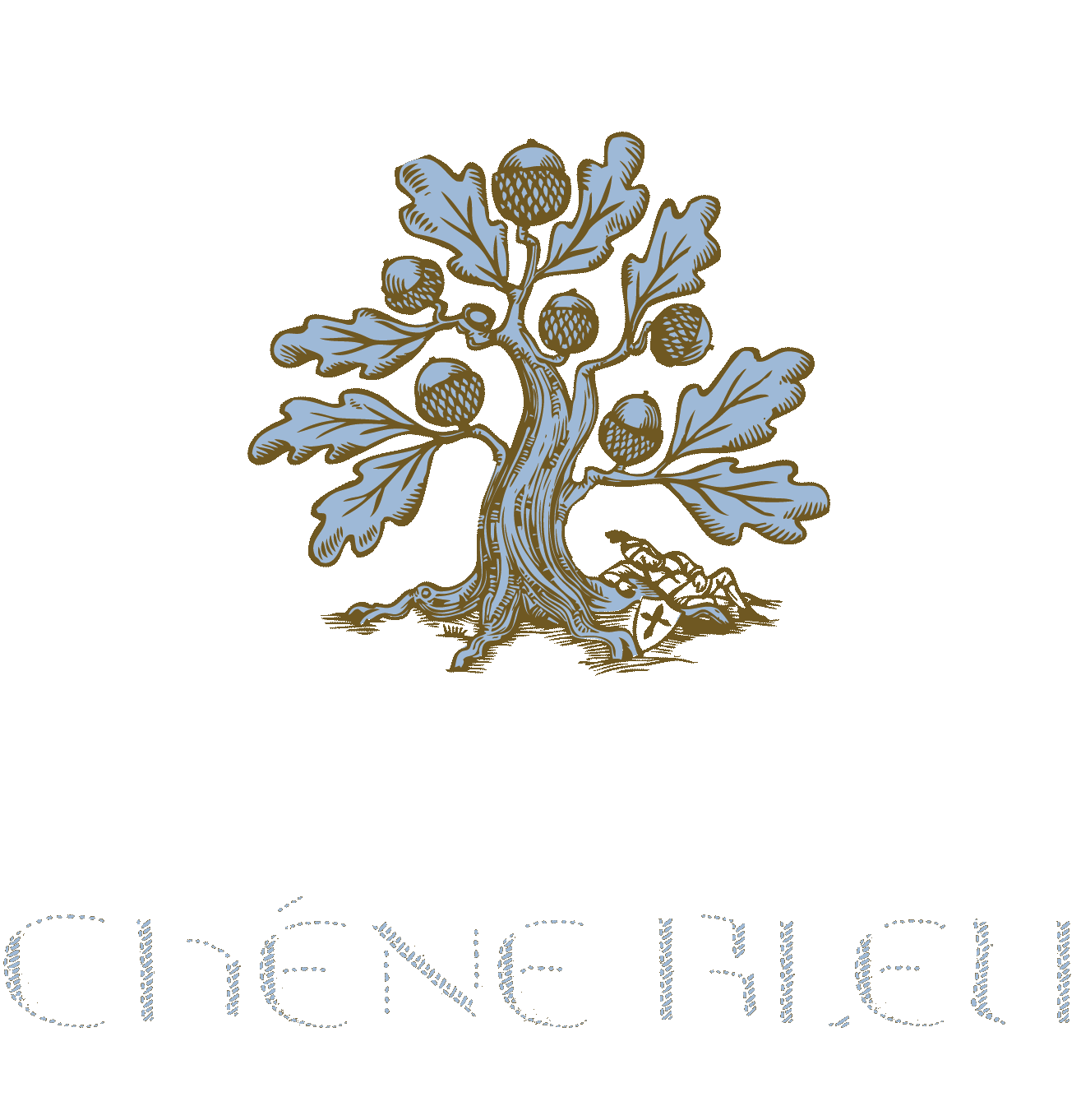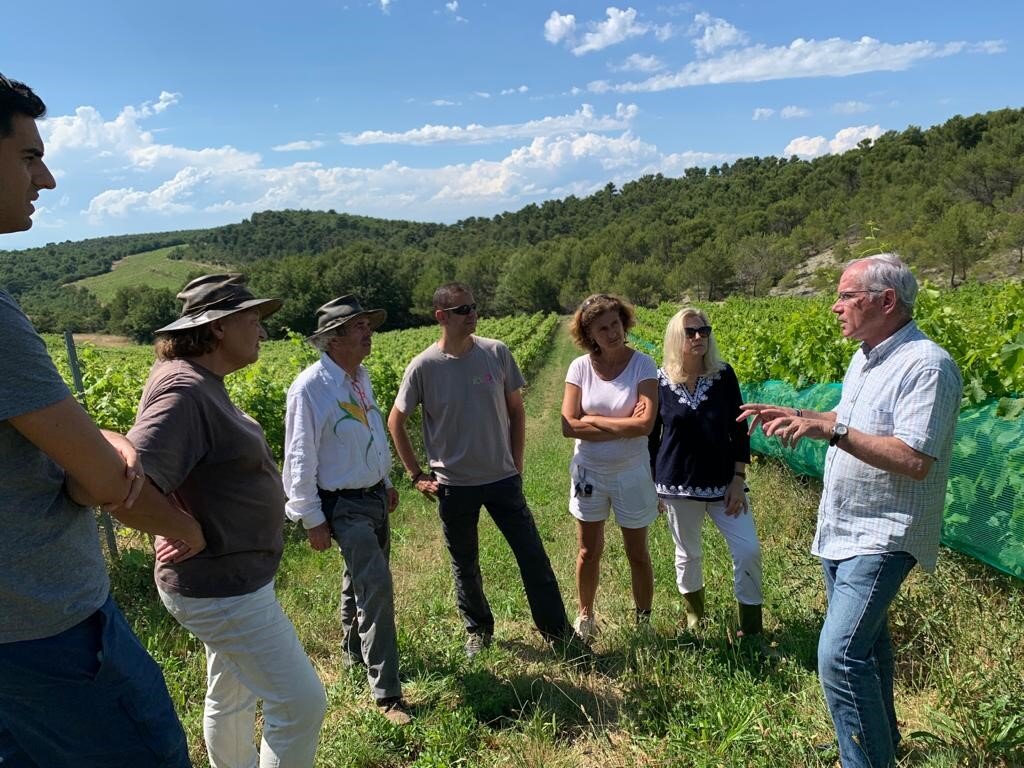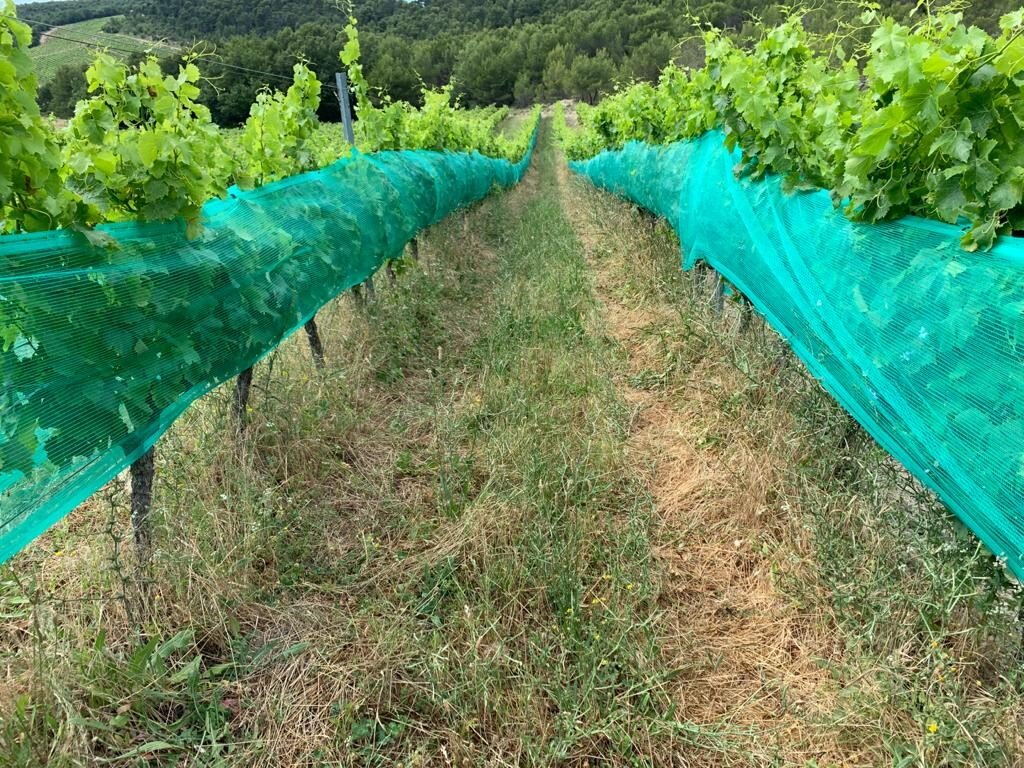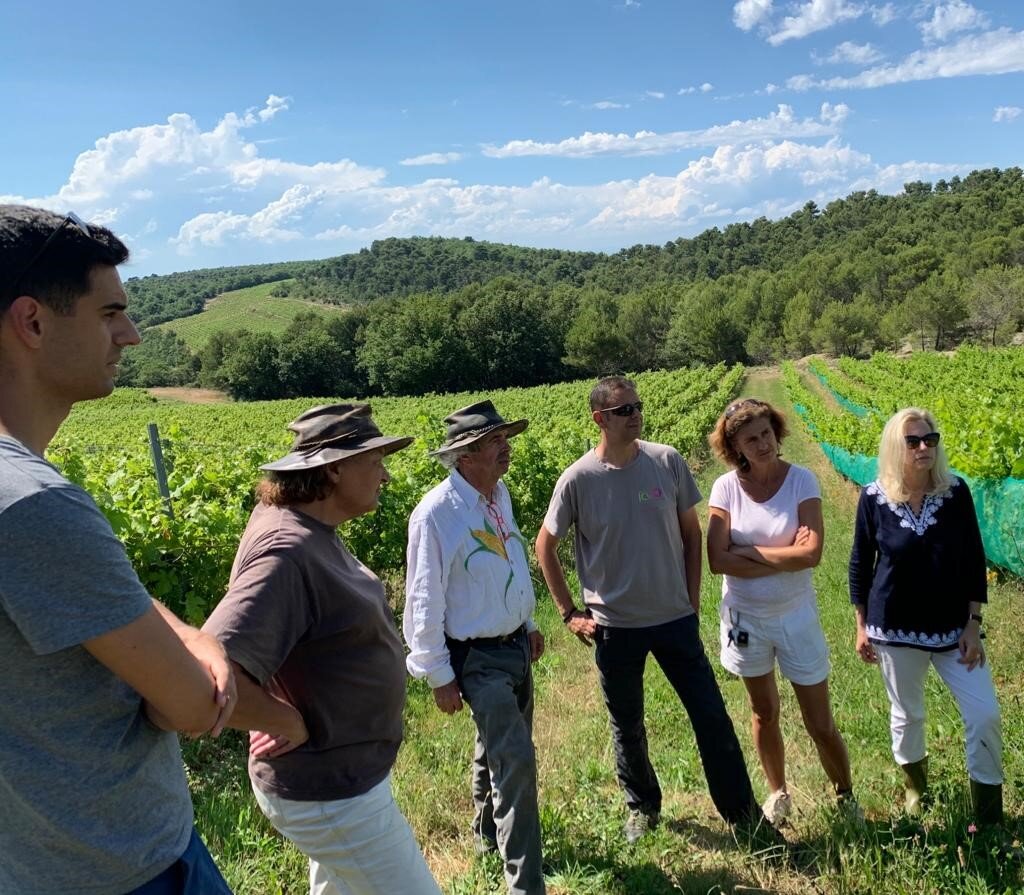About the SustainaBEElity Project: Pioneering sustainability in wine by exploring the power of bees.
The SustainaBEElity project “Beehives for Biodiversity” is a non-profit, practical-research initiative launched at Chêne Bleu, a family-owned, multi-award-winning winery located in the foothills of Mont Ventoux in southern France in a UNESCO biosphere reserve. As early adopters of sustainable viticulture passionate about nurturing the environment, our goal is to produce wines according to organic and biodynamic principles, hence our work to experiment with practices that lead to new thinking about the role that winemakers play in caring for nature, our planet, and our health.
This led us to offer our vineyard up for study and experimentation by local and international team of renowned scientists and experts in the study of bees and microbiology. In collaboration with these scientists, we are researching the impact that an increased bee population would have on the local biodiversity, improving the natural resilience of the vineyard, the quality of the soils, and the complexity of the wines.
At the end of 2019 we launched a crowdfunding campaign through winefunding.com, opening the opportunity to clients, members of the community and other interested parties to join us in driving forward this initiative. The interest in our project has been very motivating from the onset; we successfully concluded our crowdfunding campaign in 1Q2020 with pledges reaching 150% of the targeted funds, and for this we are enormously grateful to our supporters. A year on, here is the report of our milestones on the project. If you like our work and would like to participate in this initiative, as a fellow winemaker or in any other capacity, please reach out to us per the GET INVOLVED section below.
More info about our crowdfunding campaign and the launching of our sustainability project: https://www.winefunding.com/en/chene-bleu
More about Chêne Bleu wines: www.chenebleu.com
More about La Verriere: www.laverriere.com
SPRING 2021
This post is dedicated to bee-loved bee lovers everywhere,
As the first year of our SustainaBEElity project draws to a close, we are pleased to report the following progress despite the impact of the COVID-19 pandemic, as we’ve nevertheless managed to lay the groundwork for achieving the goals of our project this year.
In the midst of all the challenges, visits to La Verrière from some of our local SustainaBEElity supporters have been a highlight, and we look forward to being able to welcome more of them in the coming year, as travel restrictions are (hopefully!) eased.
SUSTAINA-BEE-LITY POW-WOW IN APRIL
We’re planning a gathering of SustainaBEElity supporters to meet the scientists collaborating with us on this project as well as our new Beekeeper, Julien. We’ve tentatively scheduled our first Bee Event for the last weekend of April 2021, based on everyone’s travel options and government restrictions.
OUR PURPOSE
The unique ecosystem within which our vineyard thrives, set in the heart of the Mont Ventoux UNESCO Biosphere Reserve, has existed long before even the Templars began farming the land in the Middle Ages.
Over the years of renovating the ancient estate and studying the impact that biodiversity can have on the productivity and resilience of the vines, we have become increasingly convinced of the important role that bees play in protecting and supporting this delicate ecosystem.
Through our SustainaBEElity project, we have begun pursuing the dual aims of developing our apiary to build on our work and to see if "more bees can make better wine", as defined below. To do that, we have offered our vineyard to a team of scientists interested in spearheading a groundbreaking scientific research project investigating the effect that bees have on the winemaking process, from viticulture all the way through to the finished wines.
2020: SCALING UP SUSTAINA-BEE-LITY
OUR NEW BEEKEEPER
Julien Vachet, an experienced young beekeeper, has joined our team to assist Xavier, the estate’s founder, and passionate beekeeper in his own right, to help us install our new hives and introduce the new colonies. Julien’s father is the local Bee Guru recommended by our partners from the Mont Ventoux Biosphere Research Centre and teaches bee life at schools and in the community.
THE FIRST NEW HIVES
In keeping with Julien’s advice, we are installing the new hives in phases. Last spring the first batch of ten hives was set up, and the new colonies of Carniolan honeybees were introduced. Both Julien and his father are very pleased with the uptake of the hives by the new colonies, and the bees appear to be thriving. We did lose 2 hives, but that is quite typical in the first years.
To learn more about our bees, see Appendix A.
We have more plans for developing the apiary, with seven further hives set for installation this coming spring!
WILDFLOWER PLANTING
Planting of patches and beds of Bee-friendly plants and wild flowers was carried out near the hives this spring to make it easier for the bees to have a fresh food supply while the colonies establish themselves.
Sébastien, La Verrière’s new Head Gardener (who did his apprenticeship with us in the past), will be working closely with Julien in the coming months to carefully plan expanding the plantings to other areas of the vineyard, in alignment with the experiments being carried out as part of the SustainaBEElity research project.
THE LAND OF WINE & HONEY
Julien was very pleased with the quality of the first honey harvested from the new hives. He deliberately didn’t push their productivity this year as they were just settling in, so the yield was small, but he expects it to double by next year if climate conditions are similar. We hope to have enough honey for everyone this coming year, as our hives go from strength to strength!
GRATIFYING CERTIFICATIONS
We are thrilled to have received a Level Three (highest rating) of HVE (Haute Valeur Environmentale) certification this year. The HVE is the most recognized certification in France awarded to farmers and winegrowers who promote particularly friendly environmental practices in their work, from wine cultivation to bottling. Levels Two and Three are certified by a certifying body approved by the Ministry of Agriculture). We are also delighted to have received a Bee-Friendly certification -- awarded to pollinator-friendly products -- in addition to our existing Ecocert organic certification. These applications were laborious and time-consuming, involving tons of paperwork and site visits from the certifying bodies, we're very happy to have them and see that our hard work is making a difference. We have now turned our minds to the very comprehensive BCorp certification.
BREAKING NEWS
France is the first country in the world to ban neonicotinoid pesticides and four other pesticides that are known to be involved in the colony collapse disorder that has been threatening bees worldwide. Cue applause! This is hugely important and hopefully, others will follow suit-- we hope anyone who cares about these issues will consider asking your elected officials to support these efforts.
CROSS-POLLINATING THE LOCAL AND GLOBAL COMMUNITY
In line with Chêne Bleu’s motto - Non mihi, non tibi, sed nobis (Not mine, not yours, but ours) – we’re taking a collaborative approach to implementing SustainaBEElity and sharing our findings. We’ve started to connect with like-minded winegrowers around the world and have had some great interest from a number of prestigious domaines, from as close as Bordeaux and Provence to as far as Argentina, as well as some early coverage from the Press. Recently, our estate was featured in a 30-minute documentary on Sustainable Food solutions to be submitted to the Sundance Film Festival.
We’re hoping to firmly establish a global ‘hive mind’ of winemakers in the coming year and begin working with them to share knowledge and test findings.
We also engage with the community closer to home on this project. We're working with the mayor here in our village of Crestet to run a SustainaBEElity event for the local elementary school, to explore the apiary and learn about the importance of bees throughout the ecosystem.
2020: LAYING THE GROUNDWORK FOR THE RESEARCH PROJECT
“DO MORE BEES MAKE “BETTER” WINE?
In parallel with developing the vineyard’s apiary and introducing new colonies, we aim to put our outdoor eco-lab (as we like to think of the vineyard) and its position in the rich ecosystem of the Mont Ventoux UNESCO Biosphere Reserve to use in answering that question.
Taking as a starting point our definition of great wines as those that have a distinct sense of place, the components of the research project are as follows:
For more information about the components of the research project see Appendix B.
BEE-BLIOGRAPHY
In March, we undertook the first review of the current research landscape, to create a BEEbliography, which you can explore in Appendix D.
THE SCIENTISTS
Our talented friend and Green Advisor, Katja Klopf, helped us scour the globe to find the best bee, cover crop and microbiome experts. We are honored to have been connected to world experts Professor Neal Williams (UC Davis), Professor Dave Goulson (University of Sussex), Professor Yves Le Conte (INRAE- Institut National de Recherche pour l'Agriculture, l'Alimentation et l'Environnement), plus our beloved Doctors Claude and Lydia Bourguignon, the world-renowned "living soils" scientists who have been advising us for over a decade.
Read their impressive BEEographies in Appendix C.
Our experts have met twice this past year, and the aim for the coming year is to draw up the protocol and diagram of scientific process and methodology for the research project and to appoint a research assistant to supervise work on the project at the vineyard.
THE FIRST EXPERIMENTS
The first theory we have begun testing is whether bees help vines increase their yields on our property. By covering a section of vines with netting right before flowering, we prevented pollinators from accessing the nascent clusters with the aim of counting a difference in the number of berries (individual grapes) at harvest, and comparing this with a second section of vines that would have had the benefit of pollinators.
We purchased several mini-tanks to be able to vinify these two sections separately and begin testing a second, very important theory – whether the presence of bees and pollinators has an influence on the famous “terroir”, the revered ‘sense of place’ that comes through in fine wine – and the grapes from the netted and un-netted sections of vines have been harvested and vinified separately.
The next step in this process will be to carry out an initial ‘geosensorial’ taste test of the wines from these separate tanks, and then to begin iterative development of these experiments, with guidance from the relevant scientists in our team of experts.
We’re excited to continue the work that we’ve started. We know this has been a tricky year for us homo sapiens, but the natural world continues to thrive and support us. Bees are foundational to the delicate ecosystem and food supply chain that we rely on, and we thank you for your part in supporting our SustainaBEElity project!
GET INVOLVED
We would love be contacted by anyone interested in collaborating on this project, for example by fellow winemakers offering their vineyard for this study. Please read the GET INVOLVED section below. Just send an email to contact@chenebleu.com and mention this SustainaBEElity Initiative.
Even if you are not a winemaker, if you like what we do, or you would like to know about our projects, Chêne Bleu Wines and upcoming social events, there are many ways that you can get involved:
Add a comment to this blog or endorse us
Help us to spread the word by forwarding this blog link to your contacts: https://www.chenebleu.com/news-blog/2021/3/16/sustainability-biodiversity-blog
Follow us on: Twitter:@chenebleuwine | Instagram: @chenebleuwine; https://www.facebook.com/chenebleu/
Visit us at: www.chenebleu.com; www.laverriere.com; https://www.winefunding.com/en/chene-bleu
Other ways of supporting us:
FUNDING: In collaboration with scientists, we are looking for funding to support a research assistant to manage the scientific profile of the project. Any contacts or suggestions about an institution that can help us with this purpose are welcome!
Visit our eco-lab and learn about biodiversity, sustainability, and fine wine production at La Verriere! https://www.booking.laverriere.com/, https://www.chenebleu.com/get-in-touch
Best wishes to BEE safe and sane in 2021,
Nicole and the C-Bee Team
APPENDICES:
A) GET TO KNOW OUR BEES
Carniolan honey bees have been selected to inhabit the apiary at La Verrière. This sub-species of the Western Honey Bee is known for being less aggressive than other species and easy
to work with. Having originated in the Austrian Alps, Danube Valley and Yugoslavia, they’re particularly suited to the micro-climate of Mt Ventoux. Carniolan bees are able to weather the colder months and adapt quickly to changes in conditions. Honey flow typically lasts from late April to early June.
While they are smaller than the other species, they are known for being particularly resistant to diseases and pests.
B) COMPONENTS OF THE RESEARCH PROJECT
Although vines are self-pollinating, bees can increase yields by up to 30% by pollinating the tiny flowers during the short flowering season (two weeks max). Yields are essential to the economics of financially sustainable vineyards which usually have high fixed costs and therefore are very affected by yields; vineyards that boost yields through the use of synthetic fertilizers typically incur higher costs (from the purchase and application of the fertilizers) as well as more damage to the environment and lower quality of grapes produced, as typically they will be farmed as mono-culture and therefore the extra grapes will compete for nutrients, water and other finite resources.
Bees facilitate the spread of cover crops: in order to retain water in the soil, house a great diversity of microbiome and provide a healthier, self-sustaining pest resistant environment for the grapes, the spread of cover crops, ideally every two rows, and the discontinuation of tilling which upsets the microbiome is a fantastic and sustainable substitute for synthetically-based fertilizers and pesticides. 80-90% of cover crops are cross-pollinating species so they benefit directly from bees, and in theory, the more bees there are, the faster they spread, especially if there are many wild flowers in the mix. These ensure an ideal edible environment for the bees to thrive in.
The diversity of cover crops means a diversity of microorganisms. New research shows the symbiotic relationship between plants and the microbiome of the soil. Just like with humans, this diversity has been shown to be very beneficial as the microorganisms break down the soil and make it into nutrients that are absorbable by the plants, in particular nitrogen.
The microbiome protects the plants and, in the process, transmits the sense of place by passing on into the grapes the specificities of the different soil types that are a foundational characteristic of fine wine, which typically allows you to ‘travel’ to a certain place just by virtue of the flavors and nuances of the wine in your glass. ‘Geosensorial’ blind tastings often confirm the “terroir”-specific origins of these nuances. Today there is validated research in all these separate areas, but to the best of our knowledge, no one has attempted to follow this logic through from the presence of the bees to the styles and qualities of the wines themselves.
C) THE SCIENTISTS
Prof Yves Le Conte
Prof Le Conte is a world-renowned expert on bees and bee habitats. He is a highly experienced researcher for the French National Institute for Agriculture, Food, and Environment (INRAE) and has collaborated with UC Davis on several projects. Professor Le Conte will be bringing his expertise to provide best practices to optimize the bees’ habitat.
Prof Dave Goulson
Prof Goulson is Professor of Biology (Evolution, Behaviour and Environment) at the University of Sussex. Specializing in the ecology and conservation of insects, particularly bumblebees, Prof Goulson is the author of several books, including Bumblebees: Their Behaviour and Ecology (2003), and over 200 peer-reviewed articles. In 2006 he founded the Bumblebee Conservation Trust, a charity that aims to reverse the decline in the bumblebee population. He was involved in the project that led to the book Wilding. Prof Goulson will be advising the cover crop optimization for providing bee-friendly habitats and vine health.
Prof Neal Williams
Prof Williams is Professor of Entomology at UC Davis. His research interests lie in pollination ecology, bee biology with an emphasis on foraging behavior, ecology and evolution of trophic specialization and plant-pollinator interactions, landscape change and community dynamics, ecosystem services and conservation. In addition to his expertise in the interaction of bees and with the ecosystem, Prof Williams brings practical field experience, collaborating with viticulturists and other farmers.
Dr Claude Bourguignon and Dr Lydia Bourguignon
The Bourguignons are well-known microbiologists who work as consultants to many of the world’s top domaines, such as Domaine de La Romanée Conti and Harlan Estate. Having met and worked for a decade at INRA (now INRAE), they went on to set up their own soil laboratory (LAMS) in 1989. They have extensive hands-on experience studying the microbiome of vineyards, recommending best practices to support vine health and also increasing the impact of living soils on the ‘geosensorial’ analysis of wine.
In this study they will be driving the parts of the research around the impact of yeasts carried by the pollinators on yields and the impact on the quantity and quality of microorganisms from the change in cover crop management, as well as comparing and contrasting the taste of the wines produced from vines pollinated by bees with vines isolated from bees with the netting program.
D) BEE-BLIOGRAPHY
Dr Claude and Dr Lydia Bourguignon: https://www.academievin.org/role-du-sol-dans-lexpression-du-terroir-par-claude-bourguignon/ & https://www.canal-u.tv/video/universite_de_bordeaux/la_microflore_du_sol_une_alliee_de_choix_pour_la_nutrition_qualitative_de_la_vigne.35321
Plant species Richness, elevated CO2, and atmospheric nitrogen deposition alter soil microbial community composition and function, Haegeun Chung et al
Ecological Economics of Biodiversity Use for Pest Management by Mark Gillespie & Steve D. Wratten
Tillage intensity or landscape features: What matters most for wild bee diversity in vineyards? By Sophie Kratschmera
Pollination increases yields: Muñoz-Rodríguez, A.F., Tormo, R., and Silva, M.I. 2011. Pollination Dynamics in Vitis vinifera L. American Journal of Enology and Viticulture 62(1): 113-117 https://onlinelibrary.wiley.com/doi/10.1002/9781118231838.ch4
Carbon: Kelly Mulville, a regenerative vineyard consultant at Paicines Ranch, calculated that this allows vines to sequester up to 3.5 metric tons of CO2 per acre, so if we converted 18 million acres of vineyards worldwide to regenerative (sustainable) agriculture, we could potentially sequester enough carbon to offset the entire fossil fuel emissions of the industry’s supply chain, including the worst offenders like packaging and transport. One could argue we should all be in a haste to do our part in the vineyard while the wine trade tackles its responsibilities in the rest of the chain.
Climate change: Plant diversity drives soil








